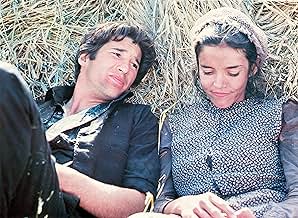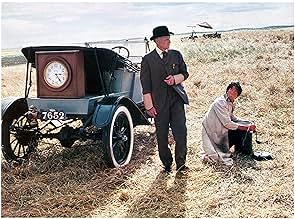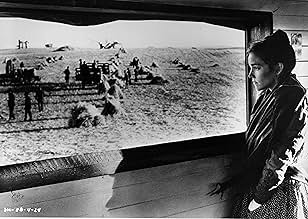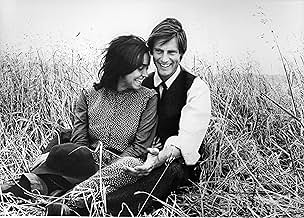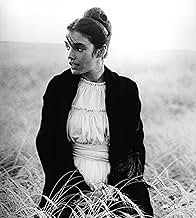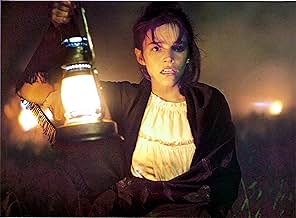A hot-tempered farm laborer convinces the woman he loves to marry their rich but dying boss so that they can have a claim to his fortune.A hot-tempered farm laborer convinces the woman he loves to marry their rich but dying boss so that they can have a claim to his fortune.A hot-tempered farm laborer convinces the woman he loves to marry their rich but dying boss so that they can have a claim to his fortune.
- Won 1 Oscar
- 13 wins & 13 nominations total
Robert J. Wilke
- The Farm Foreman
- (as Robert Wilke)
Timothy Scott
- Harvest Hand
- (as Tim Scott)
Terrence Malick
- Mill Worker
- (uncredited)
- Director
- Writer
- All cast & crew
- Production, box office & more at IMDbPro
Featured reviews
Terrence Malick is less a storyteller than a visual poet. At times, the images in 'Days of Heaven (1978)' seem too beautiful to be believed – could Mother Nature even construct such moments of magnificence at her own accord? Cinematographers Néstor Almendros and Haskell Wexler (credited only as "additional photographer") consistently shot the film during the "magic hour" between darkness and sunrise/sunset, when the sun's radiance is missing from the sky, and so their colours have a muted presence, as though filtered through the stalks of wheat that saturate the landscape. Crucial alongside the film's photographers are composer Ennio Morricone – utilising a variation on the seventh movement ("Aquarium") in Camille Saint-Saëns's "Carnival of the Animals" suite – and a succession of sound editors, whose work brings a dreamy, ethereal edge to the vast fields of the Texas Panhandle. The film's final act, away from the wheat-fields, recalls Arthur Penn's 'Bonnie and Clyde (1967),' but otherwise Malick's style, contemplative and elegiac, is in a class of its own, more comparable perhaps to Kurosawa's 'Dersu Uzala (1975).'
Malick refuses to explore his characters' motivations. The viewer is deliberately kept at an arm's length, and Malick eschews cinema's traditional notions of narrative development. Instead, the story is told as a succession of fleeting moments, the sort that a young girl (the film's narrator, Linda Manz) might pick up through her day-to-day experiences and muted understanding of adult emotions. Note that the girl is always kept separate from the dramatic crux of the film – the love-triangle between Billy, Abby, and the Farmer – and her comprehension of events is tainted by her adolescent grasp on adult relationships and societal norms. I was reminded of Andrew Dominik's recent 'The Assassination of Jesse James by the Coward Robert Ford (2007)' {another sumptuously-photographed picture}, which also refused to explore its title character, Jesse James, kept at a distance through the impartial objectivity of the historical narrator. In Malick's film, Linda's narration tells us one thing, and the viewer sees another. But one can never fully understand the complex emotions driving human behaviour, so perhaps the girl's perspective is as good as any other.
'Days of Heaven' derives its title from a passage in the Bible (Deuteronomy 11:21), and Malick's tale of jealousy and desire is suitably Biblical in nature. Essential to this allegory is an apocalyptic plague of locusts, which descend upon the wheat-fields like an army from the heavens. When the fields erupt into flame, quite literally from the broiling emotions of the film's conflicted characters, the viewer is confronted by the most intense manifestation of Hell-on- Earth since the burning village in Bondarchuk's 'War and Peace (1967).' But, interestingly, Malick here regresses on his own allegory: Judgement Day isn't the end, but rather it comes and goes. Life is driven by the inexorable march of Fate: The Farmer (Sam Shepard) is doomed to die within a year; Bill (Richard Gere) is doomed to repeat his mistakes twice over. In the film's final moments, Linda and her newfound friend embark purposelessly along the railway tracks, the tracks being a physical incarnation of Fate itself: their paths are laid down already, but we mortals can never know precisely where they lead until we get there.
Malick refuses to explore his characters' motivations. The viewer is deliberately kept at an arm's length, and Malick eschews cinema's traditional notions of narrative development. Instead, the story is told as a succession of fleeting moments, the sort that a young girl (the film's narrator, Linda Manz) might pick up through her day-to-day experiences and muted understanding of adult emotions. Note that the girl is always kept separate from the dramatic crux of the film – the love-triangle between Billy, Abby, and the Farmer – and her comprehension of events is tainted by her adolescent grasp on adult relationships and societal norms. I was reminded of Andrew Dominik's recent 'The Assassination of Jesse James by the Coward Robert Ford (2007)' {another sumptuously-photographed picture}, which also refused to explore its title character, Jesse James, kept at a distance through the impartial objectivity of the historical narrator. In Malick's film, Linda's narration tells us one thing, and the viewer sees another. But one can never fully understand the complex emotions driving human behaviour, so perhaps the girl's perspective is as good as any other.
'Days of Heaven' derives its title from a passage in the Bible (Deuteronomy 11:21), and Malick's tale of jealousy and desire is suitably Biblical in nature. Essential to this allegory is an apocalyptic plague of locusts, which descend upon the wheat-fields like an army from the heavens. When the fields erupt into flame, quite literally from the broiling emotions of the film's conflicted characters, the viewer is confronted by the most intense manifestation of Hell-on- Earth since the burning village in Bondarchuk's 'War and Peace (1967).' But, interestingly, Malick here regresses on his own allegory: Judgement Day isn't the end, but rather it comes and goes. Life is driven by the inexorable march of Fate: The Farmer (Sam Shepard) is doomed to die within a year; Bill (Richard Gere) is doomed to repeat his mistakes twice over. In the film's final moments, Linda and her newfound friend embark purposelessly along the railway tracks, the tracks being a physical incarnation of Fate itself: their paths are laid down already, but we mortals can never know precisely where they lead until we get there.
This is truly a unique movie: in a class by itself. I had that opinion the first time I saw it on VHS and still feel the same way years later. It's been at the top of my list of favorite movies since I began compiling a list over a decade ago.
It's very dream-like, surreal, a film I never get tired of watching and I've watched this film more than any other in my large collection. If I had to pin it down to two reasons why, it would be the video and the audio.
The cinematography alone makes this movie worth watching repeatedly. Now that we all have access to a widescreen DVD version of this, the scenes are even more breathtaking. (I never had the pleasure of seeing this in a movie theater.)
The same superlatives can be used when discussing the soundtrack, a haunting music score that gets better and better each time one views this film. In fact, lately it's the music more than anything else I miss when I go periods without viewing this film.
The story is a simple one and is explained by others here. No need to repeat it. I find the narration to be unique, an unusual insight into the characters of the film and the thoughts of the little girl (Linda Manz), who does the narrating. The characters that continually fascinate me are Brooke Adams, as the lead female, and Robert J. Wilke, as the farm foreman. I guess it's their faces that intrigue me. Adams' down-turned mouth and sad look and Wilke's wrinklies catch my attention every time.
The story is interesting, generally low-key but with a few quick violent scenes that are quite memorable. More than that, one gets an incredible feel for the land and for the migrant workers of that time period. Another nice aspect of this film is the very small amount of profanity. Kids probably would be bored with this film but at least I wouldn't be afraid to show it to them.
But as many pluses as the story boasts, that haunting music and those incredible visuals are what drive me back for more. Great, great stuff.
It's very dream-like, surreal, a film I never get tired of watching and I've watched this film more than any other in my large collection. If I had to pin it down to two reasons why, it would be the video and the audio.
The cinematography alone makes this movie worth watching repeatedly. Now that we all have access to a widescreen DVD version of this, the scenes are even more breathtaking. (I never had the pleasure of seeing this in a movie theater.)
The same superlatives can be used when discussing the soundtrack, a haunting music score that gets better and better each time one views this film. In fact, lately it's the music more than anything else I miss when I go periods without viewing this film.
The story is a simple one and is explained by others here. No need to repeat it. I find the narration to be unique, an unusual insight into the characters of the film and the thoughts of the little girl (Linda Manz), who does the narrating. The characters that continually fascinate me are Brooke Adams, as the lead female, and Robert J. Wilke, as the farm foreman. I guess it's their faces that intrigue me. Adams' down-turned mouth and sad look and Wilke's wrinklies catch my attention every time.
The story is interesting, generally low-key but with a few quick violent scenes that are quite memorable. More than that, one gets an incredible feel for the land and for the migrant workers of that time period. Another nice aspect of this film is the very small amount of profanity. Kids probably would be bored with this film but at least I wouldn't be afraid to show it to them.
But as many pluses as the story boasts, that haunting music and those incredible visuals are what drive me back for more. Great, great stuff.
This is gorgeous looking film very much filmed at dusk and dawn. A film misunderstood upon its time of release and only after Terrence Malick's subsequent films can you now understand what the writer- director was aiming at.
The fact that Malick's next film emerged 20 years later we understand this is a person who wants to tell his story by visuals. Actors talking is just secondary and those scenes end up on the cutting room floor.
Days of Heaven which was shot in 70mm always had a reputation for its Cinematography which won an Oscar.
Now we can marvel at it in our homes on widescreen high definition television. You can really have those close ups of those insects. It is also a surprisingly short film, coming in at just over 90 minutes.
The tale is slight, Gere is a hothead with a girlfriend that is pretending to be his sister and his actual younger sister. They get a job whilst fleeing from Chicago in a farm in Texas where the Farmer played by Sam Shepard takes a shine to the girlfriend and marries her. Gere is aware that the Framer only has a year to live.
Apparently the film took several years to be edited and the narration from the youngest sister had to be added to make the story flow. A similar device was used by Malick in 'The Thin Red Line.'
The film might be seen as slow and maybe hard to fathom because there is relative little dialogue but as mentioned you admire the visuals and at 90 minutes it is not as slow moving as you think.
A brave beautifully crafted film.
The fact that Malick's next film emerged 20 years later we understand this is a person who wants to tell his story by visuals. Actors talking is just secondary and those scenes end up on the cutting room floor.
Days of Heaven which was shot in 70mm always had a reputation for its Cinematography which won an Oscar.
Now we can marvel at it in our homes on widescreen high definition television. You can really have those close ups of those insects. It is also a surprisingly short film, coming in at just over 90 minutes.
The tale is slight, Gere is a hothead with a girlfriend that is pretending to be his sister and his actual younger sister. They get a job whilst fleeing from Chicago in a farm in Texas where the Farmer played by Sam Shepard takes a shine to the girlfriend and marries her. Gere is aware that the Framer only has a year to live.
Apparently the film took several years to be edited and the narration from the youngest sister had to be added to make the story flow. A similar device was used by Malick in 'The Thin Red Line.'
The film might be seen as slow and maybe hard to fathom because there is relative little dialogue but as mentioned you admire the visuals and at 90 minutes it is not as slow moving as you think.
A brave beautifully crafted film.
10katsat
If any movie could be called filmed poetry, this would be it. From its first opening shot to its last frame, there is such lyricism and emotion and beauty that it almost leaves you speechless. I have not seen this movie in years, but it still affects me and I want to write about it. There is a pervading sadness to the movie, like a memory of something wonderful that could have been, that should have been, that almost was, and is all the more tragic because it was in your hands but slipped through your fingers. This is not a movie for everyone, but if you believe that film can be one of the highest forms of art, this is the film to see.
This movie was a full and happy surprise for me. This man, Malick, stood twenty years out of business because he had to be, afterwards, after such a beautiful movie he couldn't and shouldn't return with any other thing shorter than this.
Days Of Heaven is absolutely perfect cinema, the plot is not important, Malick simply wants to fill your senses and he achieves it.
I haven't had the chance to watch it in a theatre, I was four years old at the time, I've watched it on television, and I understood immediately, this man is a hero for building up such a magnificent film in the United States, in Hollywood.
A true director builds a universe of his own, with its own "time flow" and dreams and that is what Malick achieved with this film, magic, sacral art. Some sequences are "almost" (a big almost) Tarkovskyand this is a big commendation.
Days Of Heaven is absolutely perfect cinema, the plot is not important, Malick simply wants to fill your senses and he achieves it.
I haven't had the chance to watch it in a theatre, I was four years old at the time, I've watched it on television, and I understood immediately, this man is a hero for building up such a magnificent film in the United States, in Hollywood.
A true director builds a universe of his own, with its own "time flow" and dreams and that is what Malick achieved with this film, magic, sacral art. Some sequences are "almost" (a big almost) Tarkovskyand this is a big commendation.
Did you know
- TriviaThe shot of locusts ascending to the sky was shot in reverse with the helicopter crew throwing peanut shells down, and actors walking backwards.
- GoofsTowards the end of the movie, Bill fires three shots from a double-barreled shotgun without reloading.
- SoundtracksEnderlin
Written and Performed by Leo Kottke
Used by permission of Overdrive Music A.S.C.A.P. Copyright 1978
- How long is Days of Heaven?Powered by Alexa
Details
- Release date
- Country of origin
- Languages
- Also known as
- Días de gloria
- Filming locations
- Lethbridge, Alberta, Canada(Lethbridge Viaduct High Level Railroad Bridge)
- Production company
- See more company credits at IMDbPro
Box office
- Budget
- $3,000,000 (estimated)
- Gross US & Canada
- $3,446,749
- Gross worldwide
- $3,492,909
- Runtime1 hour 34 minutes
- Color
- Aspect ratio
- 1.85 : 1
Contribute to this page
Suggest an edit or add missing content





